Is Breathwork a Form of Self-Therapy for Emotional Regulation?
✨ Introduction
In moments of overwhelming emotion—panic, rage, despair, or numbness—it can feel like the body and mind are out of control. For people with Borderline Personality Disorder (BPD) and others who struggle with emotional regulation, the question often arises: “What can I do to help myself in the moment?”
Therapy and medication provide long-term support, but in-between sessions and outside professional care, people need practical self-regulation tools. Breathwork has emerged as one of the most powerful. By influencing the nervous system, calming stress hormones, and anchoring awareness in the body, breathwork often functions as a form of self-therapy for emotional regulation.
This article explores:
🌀 What emotional dysregulation looks like.
🌬️ How breathwork affects the nervous system.
🧘 Breathwork techniques for self-therapy.
🛋️ How it complements professional therapy.
🌿 Supplements that support the process.
📅 How to create a daily routine for resilience.
Looking for online therapy for people with BPD? Click Here.
🌀 Emotional Dysregulation: The Core Challenge

What it feels like
People with BPD or high emotional sensitivity often describe emotions as:
Intense 🌊 → small triggers lead to huge feelings.
Fast ⚡ → moods shift in minutes.
Overwhelming 🔥 → hard to think logically during emotional surges.
Draining 😴 → leaving exhaustion and shame afterward.
Why it happens
Amygdala hyperreactivity 🧠🔥 → brain’s alarm system fires too easily.
Weak prefrontal control ⚖️ → difficulty calming emotions once triggered.
Stress hormones surge ⏳ → cortisol and adrenaline fuel panic/impulsivity.
Attachment wounds 💔 → fear of abandonment amplifies emotional pain.
👉 Emotional dysregulation isn’t a lack of willpower—it’s a nervous system imbalance. This is why breathwork, a direct way to influence the nervous system, is so powerful.
🌬️ How Breathwork Works for Emotional Regulation
Breath is the only autonomic function we can consciously control. By guiding breath, we guide the nervous system.
Physiological effects:
Slow exhale → activates vagus nerve 🧵, calming stress response.
Diaphragmatic breathing → signals safety, reducing cortisol.
Rhythmic breathing → synchronizes heart-brain rhythms (improves HRV).
Breath holds → reset balance between O₂ and CO₂, reducing panic.
Psychological effects:
Provides an anchor in the present moment.
Creates a pause before reacting impulsively.
Builds interoception → awareness of body sensations = better emotion tracking.
Supports self-compassion → breath becomes a nurturing tool.
👉 In this sense, breathwork is like a form of self-administered therapy—a direct way to soothe emotional storms.
Want to try Breathwork? Click Here.
🧘 Breathwork Techniques as Self-Therapy
Here are effective techniques that anyone can use during emotional overwhelm.
🟦 Box Breathing (4-4-4-4)
Inhale 4s ⬆️
Hold 4s ➡️
Exhale 4s ⬇️
Hold 4s ➡️
👉 Use: Grounding during panic or impulsivity.
🌊 Resonant Breathing (5–6 breaths/min)
Inhale 6s
Exhale 6s
👉 Use: Stabilizing mood, especially when fearing rejection.
🕊️ Extended Exhale Breathing
Inhale 4s
Exhale 8s
👉 Use: Calms racing thoughts and nighttime anxiety.
🎶 Humming Exhale
Inhale deeply.
Exhale with a gentle hum.
👉 Use: Stimulates vagus nerve, reduces dissociation, fosters connection.
🌙 4-7-8 Breathing
Inhale 4s
Hold 7s
Exhale 8s
👉 Use: Best for sleep and shutting down overthinking.
✋ Hand Tracing Breath
Trace fingers with opposite hand.
Inhale up a finger (5s).
Exhale down (5s).
👉 Use: Combines breath + touch, helpful for grounding during dissociation.
⚖️ Is Breathwork “Therapy”?

Yes, in a way:
Breathwork directly regulates the nervous system.
It builds resilience and supports emotional balance.
It empowers self-soothing—something therapy aims to teach.
But also, no:
Breathwork doesn’t resolve underlying trauma or schemas.
It cannot replace the guidance, safety, and structure of a therapist.
It’s a tool, not a complete therapy.
👉 Think of breathwork as self-therapy in the moment, while professional therapy provides the long-term framework for healing.
🛋️ Therapy + Breathwork = Stronger Together
In Dialectical Behavior Therapy (DBT)
Breathwork fits into distress tolerance and mindfulness modules.
Example: Using Box Breathing during urges instead of self-harm.
In Schema Therapy
Breath helps stay present when painful abandonment memories surface.
In Mentalization-Based Therapy (MBT)
Breath creates space to reflect on emotions instead of reacting.
👉 Breathwork is the bridge: it keeps people calm enough to engage with therapy effectively.
Looking for online therapy for people with BPD? Click Here.
🌿 Supplements That Complement Breathwork
Supplements can support the nervous system, making breathwork even more effective.
Magnesium (glycinate, threonate) 🧂
Reduces muscle + nerve tension.
Best before bed for calming.
Omega-3 Fatty Acids 🐟
Improve mood regulation.
Reduce impulsivity.
L-Theanine 🍵
Promotes calm focus.
Great pre-therapy or during anxious days.
Adaptogens 🌱
Ashwagandha, Rhodiola, Reishi → balance cortisol and stress.
NAC (N-Acetylcysteine) 💊
Reduces irritability + compulsive urges.
⚠️ Always check interactions with psychiatric medications.
Looking for supplements for people with BPD? Click here.
📅 A Daily Breathwork Routine for Emotional Regulation
Morning 🌞
5 minutes Resonant Breathing.
Omega-3 + Magnesium for baseline support.
During Triggers 🌀
Box Breathing or Hand Tracing to pause.
Repeat until calm.
Evening 🌙
10 minutes 4-7-8 Breathing or Humming Exhale.
Herbal tea with L-Theanine or Reishi.
👉 Consistency builds vagal tone like a muscle, making emotional regulation easier over time.
🧩 Case Example
Lena, 27, with BPD:
Experienced panic and rage during arguments.
Began daily Resonant Breathing in mornings, Box Breathing during triggers.
Added magnesium at night and L-Theanine before therapy.
After 10 weeks: fewer outbursts, improved sleep, and more ability to “pause before reacting.”
🚧 Limitations and Cautions
Breathwork can feel unsafe for trauma survivors → start gently.
Some may feel dizzy with certain practices → adjust pace.
Supplements vary in effectiveness and need medical oversight.
Breathwork ≠ replacement for therapy—it’s a supportive practice.
🌟 Conclusion
So—is breathwork a form of self-therapy for emotional regulation?
The answer is yes and no.
🌬️ Yes → Breathwork works like self-therapy in the moment, giving people the power to regulate emotions, reduce panic, and reconnect with the body.
🛋️ No → It cannot replace therapy, which addresses the deeper roots of emotional instability.
The best path is combining:
Breathwork → real-time emotional regulation.
Supplements → nervous system support.
Therapy → long-term healing and growth.
👉 Together, these create a holistic approach to resilience, stability, and self-compassion 💖.
📚 References
Linehan, M. (1993). Cognitive-Behavioral Treatment of Borderline Personality Disorder. Guilford Press.
Porges, S. (2011). The Polyvagal Theory. W.W. Norton.
Huberman, A. (2021). Toolkit for Stress & Emotional Regulation. Huberman Lab Podcast.
Jerath, R., et al. (2015). Physiology of pranayamic breathing. Medical Hypotheses, 85(5).
Sarris, J., et al. (2016). Nutraceuticals for mood regulation. American Journal of Psychiatry, 173(6).
Related Posts
-

Stacking Adaptogens for Maximum Resilience
Adaptogens are nature’s stress shield — helping you stay calm, energized, and clear even under pressure. Learn how to stack herbs like ashwagandha, rhodiola, reishi, and schisandra for maximum resilience, balance, and long-term vitality. 🌿
-
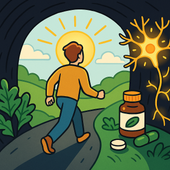
Post-Traumatic Growth and Supplements That Support It
After trauma, true healing means more than survival — it’s transformation. Learn how post-traumatic growth happens in the brain and body, and explore natural supplements like magnesium, ashwagandha, saffron, and omega-3s that support resilience, clarity, and emotional repair.
-
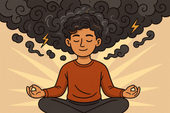
How to Regain Focus After Emotional Stress
After emotional stress, your nervous system feels frayed — your focus fades, thoughts race, and calm seems impossible. Learn how to restore balance, rebuild concentration, and retrain your brain for clarity and peace through evidence-based mind–body tools. 🌿
-

The Future of Sleep Supplements
The future of sleep supplements is here — where science meets nature. Discover how next-generation formulas use adaptogens, amino acids, and biotech innovations to support deep, restorative sleep without dependency. 🌙
-
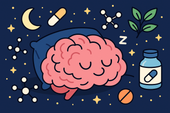
Emerging Research on Sleep and Nootropics
Can nootropics help you sleep better? Discover how compounds like L-theanine, magnesium threonate, ashwagandha, and Alpha-GPC influence neurotransmitters, circadian rhythm, and brain recovery — bridging the gap between smarter days and deeper nights. 🌙
-

New Herbal Extracts for Deep Sleep
Discover the next generation of herbal extracts for deep sleep — from saffron and magnolia to jujube and lemon balm. Learn how these plant-based compounds calm the nervous system, balance cortisol, and promote truly restorative rest. 🌙
-

Sleep Biohacking: What Works and What Doesn’t
Biohacking your sleep can sound futuristic — from red light therapy to wearables and supplement stacks. But which hacks actually help, and which are just hype? Discover the science-backed sleep strategies that truly improve rest, recovery, and brain health. 🌙
-
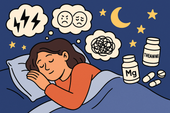
Sleep Support for People with Anxiety Disorders
💭 A restless mind can keep you up all night — thoughts spinning, heart racing, and peace feeling far away. Learn how to quiet overthinking, regulate your nervous system, and create a nightly ritual that teaches your brain to let go and rest deeply. 🌙
-
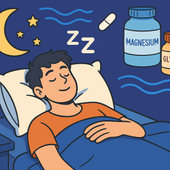
How to Fall Back Asleep After Waking Up
Waking up in the middle of the night? Learn how to fall back asleep quickly and calmly using breathing techniques, stress-reducing rituals, and natural supplements like magnesium and glycine. Restore your body’s rhythm and wake up feeling refreshed.
-
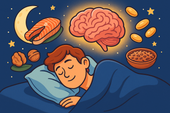
The Role of Omega-3s in Sleep Quality
-
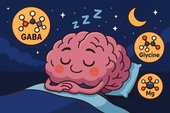
Stacking GABA and Glycine for Deeper Rest
Discover how stacking GABA and glycine can help you achieve deeper, more restorative sleep. Learn how these calming amino acids work together to relax your mind, soothe your body, and improve overall sleep quality—naturally and safely.
-

Overcoming Jet Lag with Supplements
✈️ Jet lag doesn’t have to ruin your trip! Discover how supplements like melatonin, magnesium, L-theanine, and tart cherry can help you reset your body clock faster, reduce fatigue, and recover energy naturally after long flights. 🌙
-

Managing Sleep During Times of Stress
Feeling wired and restless? Learn how to manage sleep during stressful times through nutrition, breathwork, and natural supplements like magnesium and L-theanine. Discover how to calm your nervous system and restore deep, peaceful rest—even when life feels overwhelming.
-

The Role of Magnesium for Night Cramps
Night cramps keeping you awake? Discover how magnesium helps relax muscles, balance electrolytes, and prevent painful spasms. Learn which forms work best, how to take them, and how to pair them with other nutrients for cramp-free, peaceful sleep.
-

Supplements That Reduce Nighttime Awakenings
🌙 Discover science-backed supplements that help you stay asleep through the night. From magnesium and L-theanine to glycine and ashwagandha, learn how these natural compounds calm your nervous system, balance cortisol, and prevent 2 a.m. wake-ups for deeper, more restorative rest.
-

Nootropics That Promote Calm and Rest
Explore the world of calming nootropics — natural brain enhancers that promote relaxation, better focus, and deeper rest. Learn how L-Theanine, magnesium, ashwagandha, and other adaptogens help balance your nervous system, reduce stress, and support restorative sleep.
-

Best Natural Supplement Stack for Sleep
Discover the best natural supplement stack for deep, restorative sleep. Learn how nutrients like magnesium, L-theanine, glycine, and calming herbs such as chamomile and ashwagandha work together to relax your body, calm your mind, and improve sleep quality—naturally and safely.
-

Combining L-Theanine and Magnesium for Sleep: A Calm Night, Naturally
Discover how combining L-Theanine and Magnesium can help you drift into deep, restorative sleep. Learn how this natural duo calms the mind, relaxes the body, and supports your nervous system—without grogginess the next morning.
-

How to Sleep Better After Intense Workouts
Struggling to fall asleep after a tough workout? Learn how to optimize your post-training recovery with nutrition, hydration, and science-backed sleep strategies. Discover how to calm your nervous system, balance hormones, and wake up fully recharged for your next session.
-

Ashwagandha and Valerian: A Bedtime Combo for Deep Rest and Emotional Reset
Discover the calming synergy of Ashwagandha and Valerian root, two natural sleep aids that help quiet the mind, ease anxiety, and promote deeper rest. Learn how this herbal duo supports the nervous system, balances stress hormones, and restores emotional peace — without next-day grogginess.
-

How to Create a Resilience-Boosting Diet
Discover how to build emotional and physical strength from the inside out with a resilience-boosting diet 🍎. Learn which foods stabilize your mood, how supplements like magnesium and omega-3s strengthen your stress response, and why pairing nutrition with breathwork and therapy creates lasting calm, focus, and vitality 🌿💪.
-

Best Teas and Herbal Blends for Calmness: Nature’s Way to Restore Inner Peace
Ashwagandha, the ancient adaptogenic herb, helps your body find balance during stress. Known as “Indian ginseng,” it supports cortisol regulation, boosts energy, and restores calm clarity. Discover how this powerful root promotes resilience, emotional balance, and steady vitality — one cup at a time. 🌸
-

Parenting and Emotional Strength: How to Raise Children Without Losing Yourself
Empathy is the bridge that connects hearts — the quiet power to understand, feel, and support another’s emotions without judgment. Learn how empathy strengthens relationships, enhances communication, and cultivates deeper compassion in everyday life. 🌿
-

How to Bounce Back from Public Failure: Reclaiming Confidence, Purpose, and Power
Visualization is more than imagination — it’s brain training for resilience. By picturing calm, success, or healing, you activate the same neural pathways as real experience. Learn how daily visualization rewires your brain for confidence, emotional balance, and recovery from stress. ✨
-

Coping with Financial Stress Through Resilience: How to Stay Grounded When Money Feels Tight
Body awareness is the foundation of emotional resilience. By tuning into your body’s signals — tension, fatigue, or calm — you learn to recognize stress before it overwhelms you. Discover how mindfulness, gentle movement, and breathwork can deepen your connection with your body and restore balance from the inside out. 🧘
-

How to Stay Positive During Chronic Illness: A Guide to Emotional Strength and Hope
Creativity is more than art — it’s a form of healing. Whether through painting, writing, music, or small acts of expression, creativity helps release emotion, calm the nervous system, and reconnect you to joy. Discover how to use creativity as a tool for emotional balance, resilience, and self-discovery. 🌿
-

Resilience Tips for Caregivers: How to Stay Strong While Caring for Others
Joy isn’t the absence of pain — it’s the quiet strength to find light even in challenging times. Cultivating joy through small daily moments restores balance, releases stress, and reminds you of life’s beauty. Learn how to reconnect with authentic happiness, rebuild emotional energy, and nurture your nervous system through gratitude, presence, and play. 🌿
-

Building Resilience After a Breakup: How to Heal, Rebuild, and Rise Stronger
Social connection is one of the strongest predictors of emotional resilience. During difficult times, genuine relationships act as anchors — calming the nervous system, reducing stress hormones, and helping you regain perspective. Learn how cultivating real human connection can strengthen your mind, heart, and overall well-being. 🌿
-

How to Stay Emotionally Strong During Job Loss
Your emotions are powered by brain chemistry — a delicate balance of neurotransmitters like serotonin, dopamine, and cortisol. When these chemicals work in harmony, you feel calm, focused, and resilient. Learn how daily habits, nutrition, and mindfulness can support your brain chemistry and boost emotional well-being naturally. 🌿
-

The Role of Hormones in Emotional Stability: How Your Chemistry Shapes Your Calm
Hormones shape more than your body — they shape your emotions, resilience, and sense of calm. From cortisol to serotonin, these chemical messengers influence how you react to stress, connect with others, and recover from challenges. Learn how to balance your hormones naturally to build lasting emotional stability and harmony within. 💫
-

Mitochondria and Emotional Energy: The Cellular Power Behind Your Mood
Breathwork is one of the most powerful tools for emotional regulation and cellular balance. Through intentional breathing, you can calm your nervous system, increase oxygen flow to the brain, and even support mitochondrial energy. Learn how conscious breathing connects body and mind — transforming stress into presence and emotional strength. 🌿
-

Inflammation and Its Impact on Mood Resilience: The Silent Link Between Body and Mind
Inflammation doesn’t just affect the body — it impacts the mind. Chronic inflammation alters brain chemistry, depletes serotonin, and makes emotional recovery harder. Learn how calming inflammation through nutrition, mindfulness, and sleep can restore balance, resilience, and a renewed sense of emotional strength. 💫
-

How Antioxidants Protect Emotional Well-being: The Hidden Link Between Oxidative Stress and Mental Health
Antioxidants do more than protect your body — they defend your mind. By neutralizing oxidative stress, antioxidants support serotonin, dopamine, and brain energy pathways that keep you calm, focused, and emotionally balanced. Discover how foods like berries, green tea, and dark chocolate nourish your brain, boost mood, and strengthen resilience from the inside out. 🌿✨
-

The HPA Axis and Emotional Health: The Hidden Bridge Between Stress and Mind
Neuroplasticity — the brain’s ability to rewire and adapt — is the foundation of emotional healing and resilience. When you face stress, trauma, or change, your neural pathways can reshape themselves to support new patterns of calm, focus, and self-awareness. Learn how daily practices like mindfulness, therapy, and breathwork strengthen neuroplasticity to transform emotional pain into personal growth. 🌸
-

Why Cortisol Control Is Key to Resilience: Mastering Stress to Build Emotional Strength
Controlling cortisol — the body’s main stress hormone — is the secret to lasting resilience. When cortisol levels stay balanced, your mind becomes clearer, emotions steadier, and energy more sustainable. Learn how breathwork, mindset shifts, adaptogens, and daily rhythms can help you calm your stress response and build true inner strength. 🌞💪
-

Dopamine’s Influence on Motivation and Recovery: Reigniting Drive and Balance
Healthy relationships are the foundation of emotional balance and resilience. Whether romantic, familial, or platonic, genuine connection releases dopamine, serotonin, and oxytocin — the brain’s “bonding trio” — helping us feel secure, motivated, and seen. Learn how trust, empathy, and communication not only strengthen your connections but also reshape your nervous system for deeper emotional well-being. 🌿🤝
-

The Role of Serotonin in Resilience: How This “Mood Molecule” Shapes Emotional Strength
Serotonin — often called the “resilience molecule” — plays a vital role in how we handle stress, regulate mood, and recover from emotional challenges. Beyond happiness, this powerful neurotransmitter helps balance the gut-brain axis, stabilize the nervous system, and support emotional flexibility. Learn how nutrition, sunlight, mindfulness, and adaptogens can naturally boost serotonin and strengthen your emotional resilience. 🌞🧠
-

How Neuroplasticity Supports Emotional Growth: Rewiring the Brain for Resilience
Neuroplasticity is the brain’s built-in power to grow, adapt, and heal — and it’s the foundation of emotional transformation. Every mindful breath, compassionate act, or reframed thought strengthens new neural pathways that support resilience and self-awareness. Learn how your brain rewires through daily habits, helping you turn emotional challenges into opportunities for growth and calm. 🌿
-

Tai Chi and Adaptogens for Mind-Body Balance: The Art of Harmonizing Energy and Resilience
Alchemy isn’t just an ancient science — it’s a timeless symbol of transformation and inner balance. By blending the physical and spiritual, alchemy teaches us that change begins from within. Just as metals are refined into gold, we too can transmute emotional pain, stress, and chaos into clarity and strength through mindful practice and self-awareness. 🌙✨
-

Cold Therapy and Emotional Control: Training the Mind Through the Body
Cold therapy isn’t just for athletes — it’s a tool for emotional mastery. By exposing your body to controlled cold, you train your nervous system to stay calm under stress, improving focus, mood, and resilience. This article explores the science of cold exposure, its impact on hormones and the vagus nerve, and how ice baths and cold showers can help you build emotional control, one breath at a time. 🧊🧘♂️
-

How Music Influences Emotional Recovery: The Healing Soundtrack of the Mind
Neuroplasticity — the brain’s ability to rewire and heal itself — is at the heart of emotional recovery. Through mindful habits, music, therapy, and consistent mental stimulation, your brain can form new connections that support resilience and well-being. Discover how neuroplasticity turns pain into growth, helping you rebuild balance, focus, and emotional strength. 🌿
-

Nature Therapy for Building Resilience: Reconnecting With the Healing Power of the Earth
Nature therapy helps rebuild emotional resilience by reconnecting you with the healing rhythms of the Earth. From forest walks to sunlight exposure, nature restores balance to your nervous system, lowers stress hormones, and teaches emotional adaptability. Learn how spending time outdoors can enhance mental clarity, calm anxiety, and awaken your natural capacity to heal. 🌞
-

Breathwork Techniques That Pair with Supplements: The Ultimate Synergy for Stress Relief and Mental Clarity
Breathwork and supplements create a powerful mind-body synergy for stress relief, focus, and energy. By combining intentional breathing with adaptogens, nootropics, and calming nutrients, you can naturally regulate cortisol, sharpen mental clarity, and boost emotional balance. This guide explores the best breathwork techniques and supplement pairings to help you feel centered, calm, and energized from the inside out. 🌿
-

Why Cortisol Balance Matters for Emotional Strength
Balancing cortisol — your body’s main stress hormone — is essential for emotional resilience. When cortisol is chronically high, your mind stays stuck in survival mode, leading to fatigue, anxiety, and emotional instability. This article explores how nutrition, supplements, breathwork, and therapy can help restore healthy cortisol rhythms, regulate the nervous system, and strengthen your ability to handle life’s challenges with calm focus and emotional strength. 🌿
-

Best Supplements for Students During Exam Season: Focus, Energy, and Memory Support
Studying late into the night? Learn which natural supplements can boost focus, memory, and mental stamina during exam season — without the crash. From omega-3s to Bacopa and Rhodiola, discover your brain’s ultimate exam support stack. 🎓🧠
-

Natural Memory Boosters for Seniors: How to Keep Your Mind Sharp and Focused
Stay mentally sharp and confident as you age. Discover science-backed natural supplements and lifestyle habits that boost memory, focus, and brain longevity for seniors. 🌿🧠
-

The Link Between Stress, Cortisol, and Memory Loss
Chronic stress can quietly erode your memory — and cortisol is the key culprit. Learn how stress hormones affect the brain, why the hippocampus shrinks under pressure, and how natural strategies can help you restore memory and mental clarity. 🧠✨
-

How to Build a Daily Supplement Routine for Memory Health
Want to sharpen your memory and stay mentally clear? Learn how to build a daily supplement routine for memory health — from morning focus to nighttime brain repair. Discover science-backed nutrients that boost recall, focus, and long-term cognitive resilience. 🧠🌿
-

Top 5 Natural Supplements for Memory Recall and Focus
Looking to boost memory and concentration naturally? Discover the top 5 supplements — Bacopa, Ginkgo Biloba, Lion’s Mane, Rhodiola, and Phosphatidylserine — that enhance focus, recall, and long-term brain health. 🧠✨
-

Top Supplements to Balance Mood Naturally
From omega-3s to adaptogens, discover the top natural supplements proven to support emotional balance, reduce stress, and promote inner calm — safely and effectively. 🌿✨


















































